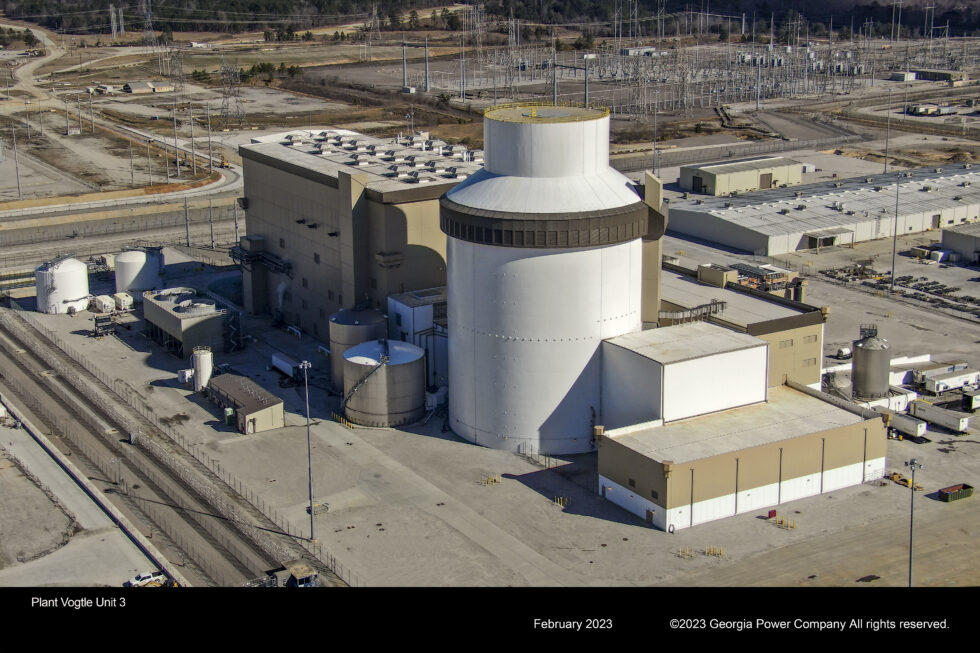
Section Branding
Header Content
PSC expert: Plant Vogtle expansion bad deal for Georgia Power customers
Primary Content

ATLANTA — Years of cost overruns at the nuclear expansion at Plant Vogtle have made the project a poor deal for Georgia Power customers, a finance expert with the state Public Service Commission (PSC), said Thursday.
The testimony of Tom Newsome, the PSC’s director of utility finance, at a commission hearing came even as the first of two new nuclear reactors being built at the plant south of Augusta — Unit 3 — is slated to begin commercial operation within a few days.
“Vogtle’s ratepayers will be paying significantly more for the power generated by Vogtle 3 and 4 than they would pay if [natural gas-fired] units had been built instead,” Newsome testified during one of the PSC’s semi-annual progress updates on the nuclear project. “Vogtle 3 and 4 are not an economic benefit to ratepayers.”
Newsome said the cost of Georgia Power’s 45% share of the project has soared to $15.2 billion, $9 billion more than the Atlanta-based utility forecast when the PSC approved the nuclear expansion in 2009. As a result, the average residential customer’s bill will increase $14.10 per month during the first five years after the work is completed, up from the $9.60 hit on monthly bills estimated 14 years ago.
The other 55% of the project’s costs are being picked up by three utility partners: Oglethorpe Power, MEAG Power, and Dalton Utilities.
Newsome blamed the overruns on poor management throughout the project, including the period before original lead contractor Westinghouse Electric Corp. went bankrupt and after Southern Nuclear, a sister company of Georgia Power, took over the work in 2017.
Specifically, he said designing and building the two reactors at the same time was not the way to go about such a complex project. There also were labor productivity issues caused by workers essentially getting in each other’s way, he said.
“The people out there trying to get the work done were doing the best they could,” he said. “[But] they just had too many people out there.”
Newsome said many of the same problems encountered with the current project occurred during the 1980s when Georgia Power was building the first two nuclear reactors at Plant Vogtle. The budget on units 1 and 2 ballooned from an original forecast of $660 million to more than $8 billion, and the project took 12 years to complete.
Units 3 and 4 originally were expected to go into service in 2016 and 2017.
Georgia Power spokesman John Kraft disagreed with Newsome’s assessment, saying the utility has consistently shown the two new units are economical and will provide an emissions-free source of electrical generation for the next 60 to 80 years.
“Nuclear energy is the only zero-emission baseload energy source available today, offering high reliability, consistently low and stable fuel costs, and efficient operations around the clock,” Kraft said. “Regarding costs, there will be a thorough review and vetting process before the Public Service Commission that will be open and transparent to the public.”
William Jacobs of GDS Associates, an independent construction monitor on the project, testified Thursday that lessons learned during the construction of Unit 3 at Plant Vogtle are being applied to save time on Unit 4, which is expected to go into service early next year.
For example, he said hot functional testing for Unit 4 — when plant systems achieve normal operating pressure and temperature without nuclear fuel in the reactor — was completed during the spring in just 42 days. The same testing on Unit 3 took 94 days, Jacobs said.
“I’m excited,” added Steve Roetger, an analyst with the PSC, referring to the upcoming opening of Unit 3. “This has been a long road.”
Steven Prenovitz of the consumer advocacy group Concerned Ratepayers of Georgia said the commission should not allow Georgia Power to recover Plant Vogtle’s cost overruns from customers.
That decision won’t be made after the Unit 4 reactor goes into service and the PSC holds a “prudency” hearing on the cost issue.
This story comes to GPB through a reporting partnership with Capitol Beat News Service.

